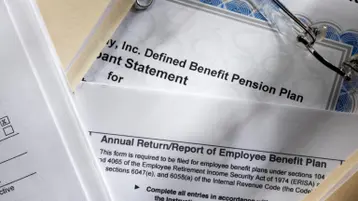
Table of contents
- 1.The Low Down on Contribution Matching
- 2.Matching Options
- 3.Multi-tier formula:
- 4.One Fun Fact
Short answer: There is no standard 401(k) employer contribution as companies can decide for themselves how much they will add to an employee's plan. That said, market trends are emerging, and the data below can give you a sneak peek into how your contributions compare with those of your competitors.
The Low Down on Contribution Matching
First things first: By law, employers do not have to match any part of an employee's investment in a 401k plan. There is, however, required annual nondiscrimination testing plans are fair to all employees. Since "Uncle Sam" offers tax incentives for the contribution-friendly employer, many businesses do offer such contributions as part of an overall employee benefits package. Some advantages are the following:
- Attracting and retaining top talent
- 401(k) contributions are tax deductible and can be tax-deferred up to a limit established by the IRS
- A 401(k) plan puts the onus of retirement investing on the employee, cutting the employer's workload.
Matching Options
When establishing a matching policy, you basically have four options:
- Percentage match: The employer contributes a percentage of the salary an employee defers into the 401(k) account
- Fixed match: The employer contributes $1 for every $1 the employee defers to the plan up to a defined contribution ceiling, such as 6% of pay
- Blanket contribution: The employer makes a blanket percentage contribution for all employees regardless of whether they defer pay into the 401k plan
Multi-tier formula:
The employer's contributions decrease as the employee's deferment increases. So, an employer might contribute dollar for dollar on the first 3 percent of pay contributed and 50 cents per dollar on the next 3 percent of pay. The most common match today is dollar-for-dollar on the first 6 percent of employee deferrals, up from a $0.50 per $1 match in 2011. While you are free to select the matching level that works best for your organization, it's important to keep in mind your overall compensation package.
One Fun Fact
A whopping 43% of workers say they would happily take a lower paycheck in exchange for a bigger 401(k) match, which is a fascinating piece of employee psychology that opens doors to you becoming the best employer since sliced bread without taking a huge hit to the bottom line.
This article is for informational purposes only, is not legal, tax or accounting advice, and is not an offer to sell, buy or procure insurance. It may contain links to third-party sites or information for reference only. Inclusion does not imply TriNet’s endorsement of or responsibility for third-party content.
Stephanie Albee
Table of contents
- 1.The Low Down on Contribution Matching
- 2.Matching Options
- 3.Multi-tier formula:
- 4.One Fun Fact





